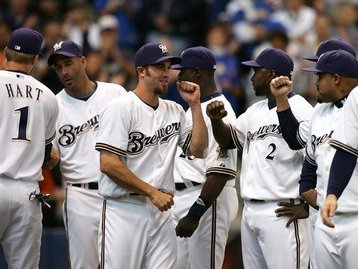Sing along if you recognize any of these little ditties...
The Brewers need to:
• sign a left-handed contact hitter
• sign a top-flight starting pitcher
• trade Rickie Weeks
• trade Bill Hall
The beat goes on and on and on and on.
Fresh off the franchise's first playoff berth (again, hum along if you know the tune) since 1982, the team has lost it's top starting pitcher -- perhaps of all-time -- could lose its second-best starter from last season, a closer and may still lose its best left-handed reliever.
On top of it all, the Brewers are still heading into spring training with the same, right-handed, homer-happy, strikeout-inducing lineup that has driven the Miller Park faithful nuts the last few seasons.
Now what?
The easy answer is, General Manager Doug Melvin should pull the trigger on a blockbuster trade or break the bank to sign a free agent. Unfortunately in the real world, it's not that easy.
The fact of the matter is, the Brewers -- save for a few spots -- aren't going to be that much different than they were a year ago ... and things turned out pretty well in 2008. Certainly, a lot of the success is credited towards CC Sabathia, but the core players -- the same ones that will make up the brunt of this year's squad -- played pretty major roles.
Those same players will be counted on again to produce similar results. They're not kids anymore, and a higher level of accountability is beyond reasonable. Melvin is counting on them to take the next step in development and production.
Earlier this week, the Brewers have reached agreement with shortstop J.J. Hardy on a one-year deal, worth roughly $4.65 million. Coming to an agreement means the team will avoid arbitration with one player, but still has a number of core players - including Prince Fielder and Corey Hart - that will get significant raises in this, their first year of arbitration.
Add in the growing contracts of Bill Hall ($6.8 million) and Jeff Suppan ($12 million), and suddenly there doesn't seem to be a lot of flexibility to make any sort of move, anyway.
Three million fans or not, the Brewers still can't afford to go out and give free agents blank checks. Signing a top-level free agent might work out and it might fail, but it will hurt the team's long-term viability, as a signing would require surrendering a first or second-round draft choice.
Those draft choices are like gold for the Brewers, especially after parting with some of the top organizational talent in the last few years. Mid-market clubs like Milwaukee need to maintain a steady flow of minor-league talent in order to remain competitive year in and year out.
The Brewers have one bona fide pitching prospect -- right-hander Jeremy Jeffress -- in their minor league system right now and he's down at Class AA Huntsville -- a long way away from Miller Park.
If Melvin were to sign somebody like John Garland, he would have to part with one of those picks, which could be used to help restock the cupboards. And then, who's to say that Garland -- or whatever other pitcher is available -- won't turn into another Suppan?
Melvin is playing with real dollars. There's a pretty substantial difference between what he's doing and what people do at home with MLB 2K9, where budgets are unlimited and the salary cap settings can be turned off.
Trading under-producing players like Hall or Weeks is impossible, especially if Melvin hopes to get quality in return; everybody in baseball knows players' shortcomings so such a move is rare.
There's still time for something to happen; Sheets could end up back in Milwaukee, Melvin could pick up another player off the waiver wire that turns into just what the team needs, or you could even see a spring training deal that shores up a weakness.
Most likely, though, it'll be status quo for the most part. A lot has been hoped for from these players and it's up to them to produce.







